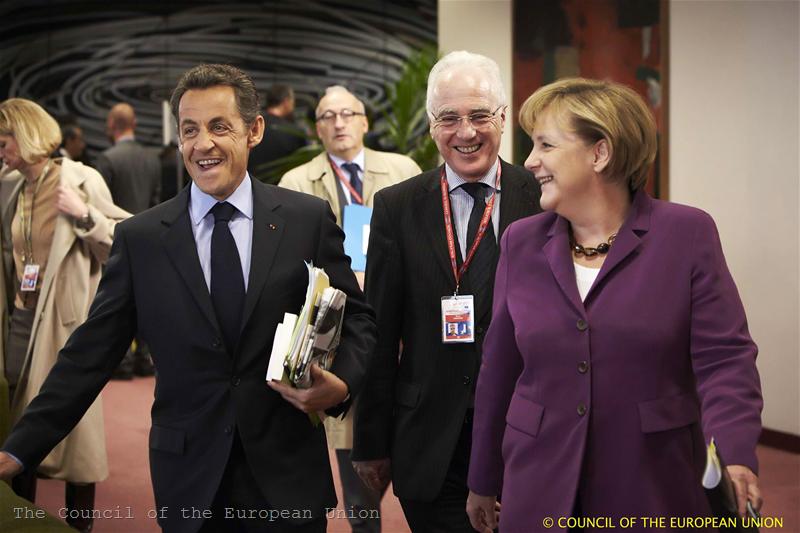Several facts and an agreement
Adelina Marini, November 8, 2010
 "It is a fact that there is a problem in the pension systems of all countries. It is a fact that deficits are being concentrated there. It is a fact that we have to make changes. It is a fact that unless we make changes, the systems will collapse. Those are the conclusions. And now the experts have to prepare options for us in the most reasonable way without violating the Stability and Growth Pact". This is what the Bulgarian PM Boyko Borissov said before Bulgarian journalists after the end of the European Council on October 29. In the very last moment a very short text has been inserted in the final Council conclusions, directly related to the pension reforms in member states that was omitted before in the draft conclusions:
"It is a fact that there is a problem in the pension systems of all countries. It is a fact that deficits are being concentrated there. It is a fact that we have to make changes. It is a fact that unless we make changes, the systems will collapse. Those are the conclusions. And now the experts have to prepare options for us in the most reasonable way without violating the Stability and Growth Pact". This is what the Bulgarian PM Boyko Borissov said before Bulgarian journalists after the end of the European Council on October 29. In the very last moment a very short text has been inserted in the final Council conclusions, directly related to the pension reforms in member states that was omitted before in the draft conclusions:
"The European Council invites the Council to speed up work on how the impact of pension reforms is accounted for in the implementation of the Stability and Growth Pact and report back to the European Council in December. Acknowledging the importance of systemic pension reforms, a level playing field within the SGP should be ensured".
This sentence has been inserted in the final document in response to the letter of nine EU members (among which Bulgaria too) to the European Commission and the European Council, insisting pension reforms costs to be deducted from their budget deficit. The letter was sent in the end of August just when the work of the task-force was gaining speed, headed by Herman van Rompuy, European Council president, on the reform of the economic governance of the Union. As you know from euinside's articles, economic governance foresees serious sanctions for countries that violate the Stability and Growth Pact not only in its part concerning budget deficit but also public indebtedness.
According to the European Voice newspaper, the insertion of the above text in the Council's conclusions was a result of a deal, according to which the nine member states that had signed the letter, had agreed to support Germany's request for changes to the Treaties of the EU in exchange for consideration of the possibility pension reforms costs to be taken into account when calculating budget deficit and public debt.
As you have probably noticed, in the short text fragment it is written "systemic pension reforms". This means that the member states that had undertaken such reforms should realise them in such a way that would ensure sustainability of public finances in the short and longer term with a trend to reduction of budget deficit and debt. And as you could see from the quote of the PM, the need of reform, according to him, is a fact.
How can this happen?
Each country has its own approach on the issue, as a large part of the member states are focusing on increasing pension age because of the turn of the demographic pyramid. Not in all countries this turn is so serious as in Bulgaria, for example, whose population aside from ageing, but the labour force is progressively diminishing because of emigration and deterioration of the educational and skills structure. As the Bulgarian Economic Chamber points out in its recent report on the "Realities of Bulgaria's labour market", every fifth person up to 24 years of age is undereducated; the quality of labour force is deteriorating; nation is diminishing; the crisis has reduced jobs by one hundred thousand. The data in the report cover the period 2005-2009.
Albeit, in Bulgaria the approach is chaotic. It started with announcing a full  preparedness for conducting painful reforms, passed through retreat and submitting to unprecedented pressure from the trade unions, accompanied by retreat of the employers. After a tormenting hesitation, an agreement has been reached in the National Council for Trilateral Cooperation for changes in the Social Securities Code. Here we have to note with respect the stubbornness of the deputy PM and minister of finance Simeon Dyankov to defend his position for an increase of the social contributions age.
preparedness for conducting painful reforms, passed through retreat and submitting to unprecedented pressure from the trade unions, accompanied by retreat of the employers. After a tormenting hesitation, an agreement has been reached in the National Council for Trilateral Cooperation for changes in the Social Securities Code. Here we have to note with respect the stubbornness of the deputy PM and minister of finance Simeon Dyankov to defend his position for an increase of the social contributions age.
The compromise
The achieved agreement has the bombastic name "National Agreement for a New Strategy for Financial Stabilisation of the State Securities Income and perfection of Pension Legislation". The introduction in the text of the deal suggests that its authors had read the European Commission's Green Paper "towards adequate, sustainable and safe European pension systems". However, what has been agreed does not imply with anything that what was written in the document of the Commission has been taken into account.
A long-term horizon is being set - 2035 when the desired result is expected to be achieved, which is "increasing the revenues and a financial stabilisation of the pension system". The problem is, however, that there are no specific numbers in the agreement that can make it clear how the set target would be achieved by the decisions taken.
The changes
According to the agreement, the consolidation and stabilisation of revenues by 2035 in the social securities system will be achieved via increasing the social contribution for the Pension Fund by 1.8 percentage points as of January 1st, 2011. Also from January 1st next year the evasion of payment of social contributions will be criminalised, written under the formula "undertaking more effective measures for improvement of social contributions collection".
This point also lacks expected results, like for example expected revenues from fines, effectiveness when putting an employer that had not paid social contributions to jail, etc. There are also no explanations whether violating employers who have temporary or more prolonged financial troubles would be taken into account. These explanations are important in order to avoid additional burdening of businesses in case of temporary troubles, which can also lead to loss of jobs, productivity and, therefore, to less revenues for the budget.
As could be expected again some privileged groups will be supported by those, united in the "third category of labour" group. For them it is envisaged to work and pay more through increasing the social contributions age by 4 months each year while reaching 37 years of contributions age for women and 40 for men by 2020. An increase of the social contributions age is envisaged for some workers in the "special" departments like the Ministry of the Interior and the Ministry of Defence. It is not mentioned, however, whether these workers will also start paying social contributions like everyone else or they will again be paid by the budget, meaning by the "third" category of labour.
In the same time, the deadline for early pensioning is being prolonged (again) for those working in the first and second category of labour by December 31st, 2014. As part of the money in the private pension funds will after all be nationalised, the pensions for these workers will be paid for the period 2011-2014 by the National Social Securities Institute (NSSI). The contributions of 12% and 7% will also be paid to the NSSI. Yet from January 1st, 2015 it is expected early pensioning for workers first and second category of labour to be paid only by the private funds.
Here as well we do not see any estimations how this can happen, given that part of the money would be transferred to the state pension system together with the contributions. It is only written that as from January 1st, 2017 the general amount of the social contribution will be increased for the universal pension funds by 2 percentage points - from 5% to 7%.
The missing ring
The way the agreement is written it makes several things more unclear. First of all, how exactly the changes, enlisted in it, will lead to financial stabilisation of the system and perfection of pension legislation. Second, where are the concrete numbers that would help us conclude whether these measures are adequate against the backdrop of the challenges not only for the pension system but for the labour market as well, which as the Chamber report points out, as well as the Green Paper of the Commission, are closely interconnected. It is also unknown what measures will be undertaken for all those people who do not take part in the labour market be it because of their law qualification or because of a lack of qualification. How the goals in the so called "pension reform" would be bound to education?
 To some point there is an answer to the latter question in the Chamber's report: "The level of employment is very much dependent on the level of education and of possession of professional skills". In other words, in order to increase employment it is necessary education to be able to provide qualified people. On the other hand it is also necessary for firms to be flexible in hiring and firing working force, depending on their needs.
To some point there is an answer to the latter question in the Chamber's report: "The level of employment is very much dependent on the level of education and of possession of professional skills". In other words, in order to increase employment it is necessary education to be able to provide qualified people. On the other hand it is also necessary for firms to be flexible in hiring and firing working force, depending on their needs.
And if we get back to PM Boyko Borissov's quote, it is a fact that changes are necessary but then the lack of explanation why precisely these measures are being undertaken and others are being postponed becomes even more obvious. There is nothing worse for an economy than instability and uncertainty. Not knowing what will happen today, tomorrow or the day after is more harmful than temporary not having orders and your business to be in trouble. For the simple reason that for every active entrepreneur it is vital to be able to plan his spending not just in months but with years ahead, so that he could decide whether to take a credit in order to expand business or to hire new personnel, or to buy new equipment, or not to do anything awaiting for better times.
The Bulgarian government not only does not create this time horizons being so necessary for the business and society but it additionally creates instability by inconsistency in its ideas. Moreover, it refuses or cannot explain its actions in a way that would bring more light to the matter. An emblematic example is how the agreement in the trilateral council is being announced. PM Boyko Borissov was on Thursday and Friday (28 and 29 October) in Brussels for the European Council, where he boasted: "in this case what in Bulgaria was being done through the years and is being done at the moment is that currently we have high pension age which is being reported as positive". On Friday there were again negotiations in the trilateral council which ended with a failure again.
What was being discussed at the Council we do not know, but on Monday the  trilateral council gathered again and we, the media, got in 13.39 o'clock a message that in 14.00 the same day the PM is holding a briefing in order to announce the agreement. This "urgency" shows that either the PM had not any idea what kind of a decision will be taken, given that the draft agreement had already been uploaded on the government's website, or he was not certain in the success of the negotiations till the very last moment and this was why he called the most zealous journalists the minute everyone signed the document. It is a fact, however, that the decision for the pension reform, postponed for a long time, is already a fact - good or bad, it is a fact exactly after the end of the European Council.
trilateral council gathered again and we, the media, got in 13.39 o'clock a message that in 14.00 the same day the PM is holding a briefing in order to announce the agreement. This "urgency" shows that either the PM had not any idea what kind of a decision will be taken, given that the draft agreement had already been uploaded on the government's website, or he was not certain in the success of the negotiations till the very last moment and this was why he called the most zealous journalists the minute everyone signed the document. It is a fact, however, that the decision for the pension reform, postponed for a long time, is already a fact - good or bad, it is a fact exactly after the end of the European Council.
This, though, is not a serious attitude toward media and the entire society which after all will bear the results of the agreement. And this is only one episode of the overall behaviour of the government which today says something and the next day - quite the opposite. We are only left to hope that the measures being taken on a European level obviously have an impact on national governments that are inclined to do reforms only in words.
 | © The Council of the European Union
| © The Council of the European Union | © The Council of the European Union
| © The Council of the European Union | © The Council of the European Union
| © The Council of the European Union | © The Council of the European Union
| © The Council of the European Union | © SofiaUtre/Bonchuk Andonov
| © SofiaUtre/Bonchuk Andonov | © EU
| © EU